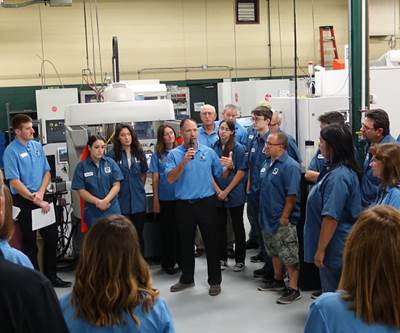Are You Communicating Effectively?
Communication in your machine shop is a two-way street.
Share




When working with companies, I frequently hear the complaint: “Nobody communicates around here.” Whether this is true depends on your personal perception. I doubt many of us would admit to being poor communicators, yet there is this a widespread belief that “others” do not communicate well. The subject of communication certainly generates a perception dilemma.
Much has been written about how to communicate effectively. Most stress that communication is really a two-way street in which both the communicator and receiver have a vested interest in the information. Each person has a list of obligations.
The communicator must:
- State the message clearly and avoid using ambiguous phrases such as “relatively important,” “reasonably good,” “pretty soon” and more.
- Avoid mixed signals such as: “It’s an important assignment but get to it when you can.”
- Ensure that the receiver clearly understands by posing thoughtful questions
The receiver must:
- Listen actively. He or she must show empathy by striving to “feel” what the communicator means, not just listen to what is said.
- Convey understanding. This can be done by paraphrasing thoughts back to the communicator: “So, in other words you are saying…” and “Correct me if I’m wrong, but I think you are telling me…”
Although we tend to blame the communicator for poor communication, it is often the receiver who does not understand what is being communicated because he or she is not paying sufficient attention or not asking for clarification. Worse yet is making incorrect assumptions.
Retention is a key component in the communication process. Studies have shown that people can only retain so much of what they are told. To improve retention, people must be reminded of what they have been told at certain intervals. If communicators are not willing to periodically repeat an important message or to remind people of a critical policy or procedure, much of what is communicated is lost. Unfortunately, many of us get frustrated when we have to say something more than once. Such people are the first to blame others when something goes awry, relying on the fact that they were told (how long ago?) and they should have known (but did they and how do you know?).
Sometimes, people have different interpretations of what is communicated. I remember a situation some time ago when I was running a department. I made a point of meeting with my employees every month to discuss their performance. It was a quick meeting to let them know what I thought they were doing well and the things I thought they needed to improve. The meeting was always private, and I thought the employees found the discussion helpful. One day a new human resources manager wanted to meet with my entire department. The first question she asked my employees was when they had their last performance reviews. You can imagine my surprise when two employees said it had been years since they had one. In this situation, my employees’ interpretation of a performance review was very different from mine. Here I was delivering what I thought was a monthly performance review, while in the minds of these two employees, what I was doing was something different. Fortunately, we all got on the same page after a brief meeting later that day, but the encounter left a lasting impression about differing perceptions when it comes to communication.
In his book “Double Double,” Cameron Herold suggests the key to good communication is listening to what people have to say instead of telling them what you need. He points out a real truth in that “Too many of us race to get our two cents in, trying desperately to be heard without first hearing what others are saying.” It is only by listening that we learn something. We cannot learn anything when we are speaking and learning something is essential to effective communication.
So, is communication as bad in companies as many may think? Are both the communicators and the receivers doing their part? Is poor communication just an easy target for complaint? I am not sure there is a universal answer to any of these questions. It is likely that communication is better in some companies than others, that many try to communicate and listen well, and that recreational complaining feels good at times. All we can do is understand what it takes to communicate effectively and try out best to travel the two-way street.
Read Next
For This Mold Shop, the Key to Closing the Skills Gap is Emotional Intelligence
Thanks to a culture change founded on a commitment to emotional intelligence, this mold supplier solved its skilled labor problem and increased throughput per employee.
Read MoreRegistration Now Open for the Precision Machining Technology Show (PMTS) 2025
The precision machining industry’s premier event returns to Cleveland, OH, April 1-3.
Read MoreSetting Up the Building Blocks for a Digital Factory
Woodward Inc. spent over a year developing an API to connect machines to its digital factory. Caron Engineering’s MiConnect has cut most of this process while also granting the shop greater access to machine information.
Read More

















.jpg;maxWidth=300;quality=90)













